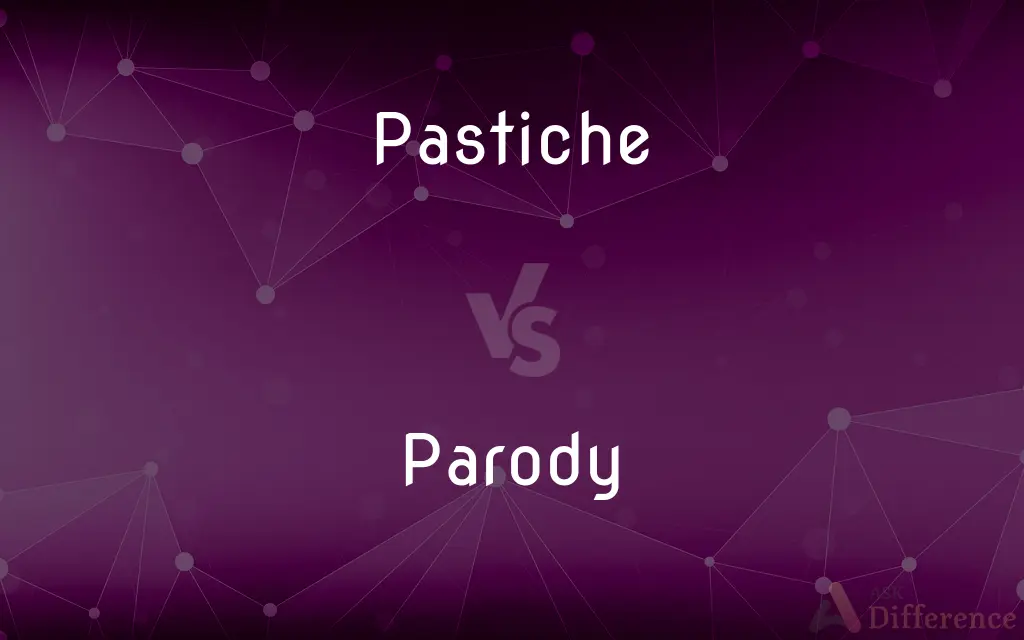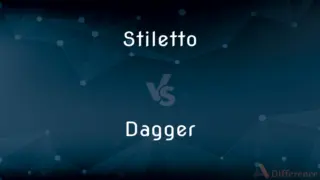Pastiche vs. Parody — What's the Difference?
By Maham Liaqat & Fiza Rafique — Updated on March 28, 2024
Pastiche combines elements from various sources or styles, celebrating them, while parody uses imitation for comic effect or critique.

Difference Between Pastiche and Parody
Table of Contents
ADVERTISEMENT
Key Differences
Pastiche is an artistic work that imitates the style or character of the work of one or more artists. Unlike a parody, it is not primarily meant for humor or satire but serves as a homage or a means to explore various styles and influences. Pastiche can be found in literature, music, and visual arts, where it respectfully acknowledges past masters and genres. On the other hand, parody specifically aims to mimic or exaggerate another work, genre, or artist, often for comic effect or critique. Parody relies on the audience's familiarity with the original work to understand the humor or criticism being presented.
While pastiche often blends multiple styles or elements to create something new or to pay tribute, parody focuses on exaggeration or distortion for comedic or critical purposes. For instance, a novel that combines the writing styles of several 19th-century authors in a new story would be a pastiche. In contrast, a novel that imitates the style of a specific author with exaggerated flaws for humorous effect would be a parody.
Pastiche is generally more about admiration and exploration, integrating different elements to celebrate or examine them. Parody, however, serves as a tool for commentary, using imitation to highlight the original work's shortcomings, absurdities, or idiosyncrasies. This difference in intent homage versus critique is key to distinguishing between the two.
The audience's reception of pastiche and parody also differs. Pastiche often requires a deep understanding or appreciation of the works being referenced to fully appreciate the nuances of the homage. Parody, while it also benefits from the audience's familiarity with the source material, primarily engages through humor, making its critique or mockery more accessible.
While both pastiche and parody involve imitation, their purposes diverge significantly. Pastiche is an exercise in admiration and stylistic exploration, celebrating the original works it references. Parody, however, uses imitation as a vehicle for humor or critique, often requiring a critical eye towards the source material.
ADVERTISEMENT
Comparison Chart
Purpose
To pay homage or explore styles
To mock or critique
Nature
Admiring and respectful
Humorous or critical
Elements Combined
Various styles or works
Specific works or styles
Audience Reception
Appreciation of referenced works
Understanding and enjoyment of humor
Intent
Celebratory or exploratory
Comic effect or criticism
Compare with Definitions
Pastiche
A work combining various styles as a homage.
The novel is a pastiche of 19th-century literature.
Parody
Imitates a work or style for humor.
The movie is a parody of spy thrillers.
Pastiche
Celebrates different artistic influences.
His music is a pastiche of jazz and classical genres.
Parody
Critiques the original through exaggeration.
The play parodies political speeches by exaggerating rhetoric.
Pastiche
Not intended for humor but appreciation.
The film is a pastiche of old Hollywood movies.
Parody
Accessible through its comedic approach.
The parody's humor makes its critique of society more approachable.
Pastiche
Blends elements to create something new.
The artwork is a pastiche of Renaissance and modern techniques.
Parody
Uses mimicry to highlight absurdities.
The song is a parody that mocks pop music clichés.
Pastiche
Requires familiarity with referenced works.
Enjoying the pastiche fully requires knowledge of its influences.
Parody
Relies on the audience's knowledge for effect.
Understanding the parody depends on familiarity with the original.
Pastiche
A pastiche is a work of visual art, literature, theatre, or music that imitates the style or character of the work of one or more other artists. Unlike parody, pastiche celebrates, rather than mocks, the work it imitates.The word pastiche is a French cognate of the Italian noun pasticcio, which is a pâté or pie-filling mixed from diverse ingredients.
Parody
A parody, also called a spoof, a send-up, a take-off, a lampoon, a play on (something), or a caricature, is a creative work designed to imitate, comment on, and/or make fun of its subject by means of satiric or ironic imitation. Often its subject is an original work or some aspect of it — theme/content, author, style, etc.
Pastiche
A dramatic, artistic, literary, or musical piece openly imitating the previous works of other artists, often with satirical intent.
Parody
A literary or artistic work that uses imitation, as of the characteristic style of an author or a work, for comic effect or ridicule.
Pastiche
A pasticcio of incongruous parts; a hodgepodge
"In ... a city of splendid Victorian architecture ... there is a rather pointless pastiche of Dickensian London down on the waterfront" (Economist).
Parody
A genre, as in literature, comprising such works.
Pastiche
A work of art, drama, literature, music, or architecture that imitates the work of a previous artist.
Parody
Something so bad as to be equivalent to intentional mockery; a travesty
The trial was a parody of justice.
Pastiche
A musical medley, typically quoting other works.
Parody
(Music) The practice of reworking an already established composition, especially the incorporation into the Mass of material borrowed from other works, such as motets or madrigals.
Pastiche
An incongruous mixture; a hodgepodge.
This supposed research paper is a pastiche of passages from unrelated sources.
The house failed to attract a buyer because the decor was a pastiche of Bohemian and Scandinavian styles.
Parody
To make a parody of.
Pastiche
(uncountable) A postmodern playwriting technique that fuses a variety of styles, genres, and story lines to create a new form.
Parody
A work or performance that imitates another work or performance with ridicule or irony.
Pastiche
To create or compose in a mixture of styles.
Parody
A popular maxim, adage, or proverb.
Pastiche
A musical composition consisting of a series of songs or other musical pieces from various sources
Parody
To make a parody of something.
The comedy movie parodied the entire Western genre.
Pastiche
A work of art that imitates the style of some previous work
Parody
A writing in which the language or sentiment of an author is mimicked; especially, a kind of literary pleasantry, in which what is written on one subject is altered, and applied to another by way of burlesque; travesty.
The lively parody which he wrote . . . on Dryden's "Hind and Panther" was received with great applause.
Parody
A popular maxim, adage, or proverb.
Parody
To write a parody upon; to burlesque.
I have translated, or rather parodied, a poem of Horace.
Parody
A composition that imitates somebody's style in a humorous way
Parody
Humorous or satirical mimicry
Parody
Make a spoof of or make fun of
Parody
Make a parody of;
The students spoofed the teachers
Common Curiosities
What defines a pastiche?
A pastiche is an artistic work that imitates the style of other artists or genres as a form of homage or exploration.
What makes a parody effective?
A parody is effective when it humorously exaggerates the original work's features, making a critique that's both understandable and entertaining.
Is parody always humorous?
While humor is a key element of parody, it can also serve to make a serious critique through its exaggerated imitation.
How do audiences typically respond to pastiches?
Audiences with knowledge of the referenced works tend to appreciate the depth and admiration in the homage that pastiches present.
Can a work be both a pastiche and a parody?
While they have different intentions, some works may blend elements of both, using homage for exploration and imitation for humor.
What is the main goal of a parody?
The main goal of a parody is to entertain by mocking or critiquing the original work through exaggerated imitation.
Are pastiches considered original works?
Yes, pastiches are considered original works, as they blend various influences to create something new, despite being heavily inspired by existing styles.
Can parody be seen as a form of flattery?
While parody often involves critique, it can also be seen as a form of flattery, as it selects works significant enough to warrant commentary.
How do creators choose works for pastiche?
Creators often choose works that they admire or find influential, aiming to explore their elements in a new, creative context.
Why do artists create pastiches?
Artists create pastiches to pay tribute to or explore the styles and influences of other works, blending them into something new.
How does parody differ from pastiche?
Parody uses imitation primarily for comic effect or critique, whereas pastiche is about admiration and stylistic exploration.
Why might a parody be misunderstood?
Without sufficient knowledge of the original work or context, the intended humor or critique in a parody may be lost on the audience.
What role does satire play in parody?
Satire is a key component of parody, as it uses humor, irony, and exaggeration to criticize or comment on the subject matter.
Do pastiches require knowledge of the original works?
Yes, appreciating a pastiche fully often requires familiarity with the works it references to understand the nuances of the homage.
How do pastiches contribute to art and culture?
Pastiche contributes by celebrating and exploring the diversity of artistic expressions, encouraging a dialogue between different styles and eras.
Share Your Discovery

Previous Comparison
Stiletto vs. Dagger
Next Comparison
Round vs. SphereAuthor Spotlight
Written by
Maham LiaqatCo-written by
Fiza RafiqueFiza Rafique is a skilled content writer at AskDifference.com, where she meticulously refines and enhances written pieces. Drawing from her vast editorial expertise, Fiza ensures clarity, accuracy, and precision in every article. Passionate about language, she continually seeks to elevate the quality of content for readers worldwide.
















































